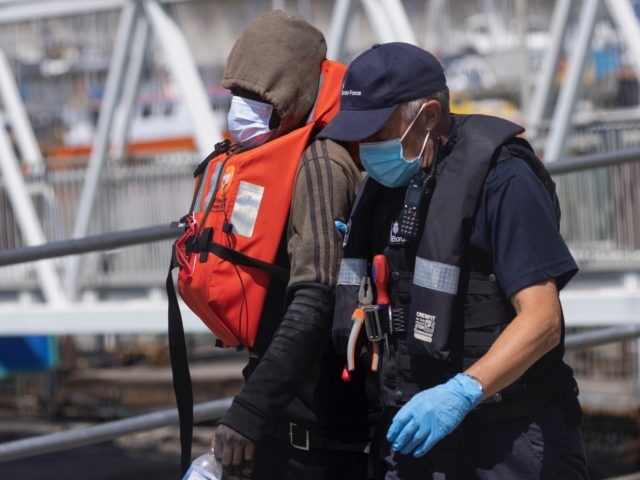Home Secretary Priti Patel’s plan to imprison illegal migrants would cost the British taxpayer £412 million per year, a study from the Refugee Council has claimed.
The Nationality and Borders Bill, which is set to be voted on by MPs in the House of Commons on Monday, would introduce four-year prison sentences for any migrants “arriving in the UK without a valid entry clearance” — at least in theory.
Under the existing framework, only those who “enter” the country illegally face prosecution, but many illegal boat migrants are actually brought ashore by the British Border Force after being intercepted in the English Channel and are therefore exempt from prison under the current rules.
A report from the Refugee Council found that the new law would apply to the vast majority of illegal boat migrants and would come at a cost of £412 million per year. When applied to a full four-year prison sentence the cost to the taxpayer would rise to an estimated £1.65 billion.
The charity also claimed that the cost of imprisoning illegals would be five times higher than the current practice of putting them in taxpayer-funded accommodation, with migrants being put up in hotels across the country.
The Refugee Council further claimed that imprisoning illegal migrants is a “brutal, cruel and cold-hearted response by this government” to the Channel migrant crisis.
“To treat vulnerable men, women and children who have put their lives at risk to reach safety in the UK as criminals is not only a huge waste of taxpayers’ money but also a brutal, cruel and cold-hearted response by this government,” said Refugee Council CEO Enver Solomon.
“For generations, Conservative prime ministers from Winston Churchill to Theresa May have given people fleeing war, terror and oppression a fair hearing on our soil. Global Britain must not now turn its back on these British values of fairness and compassion,” he added — as if would-be boat migrants are in any meaningful France, a first-world European Union member-state.
Home Secretary Priti Patel will argue, according to The Times, that the United Kingdom “does right by those in need” and that “The British people have always been generous to refugees. Since 2015, more than 25,000 refugees have been resettled from regions of conflict, more than any other European country.”
It remains to be seen if the legislation will have its intended impact if passed, however, as the Crown Prosecution Service (CPS) announced earlier this month that it will no longer attempt to prosecute migrants for illegally entering the country even under the existing legal framework.
The second reading of the Nationality and Borders Bill, which is intended to fix Britain’s “broken” immigration system, comes as another 250 illegals were brought ashore on Sunday.
The latest crossings of the English Channel from France bring the total for the year to approximately 7,743, which is less than one thousand off the 8,420 recorded during the entire year of 2020.
Brexit leader Nigel Farage has predicted that if boat migration keeps at its current pace, then by the end of the year some 30,000 illegals could reach British shores.
“I have no confidence that Boris Johnson, Priti Patel, or any of them have the guts or the courage to deal with it,” Farage said last week.
Immigration hardliners like Mr Farage have called on the government to adopt a ‘send back the boats’ approach unilaterally, as was successfully implemented by the Australian government of former prime minister Tony Abbott.
Earlier this month Farage said that the United Kingdom should cite the 1951 Geneva Convention on refugee status, which requires migrants to claim asylum in the first safe country they reach.
The Brexit leader also said that Brexit Britain should not accept the French Navy escorting migrants into British territorial waters.
The prospect of jailing migrants comes as the government has so far failed to reach agreements with most European nations on the issue of the return of fake refugees, meaning that deportations — which already fell dramatically during the Chinese coronavirus crisis — are likely to remain at low levels.
Follow Kurt Zindulka on Twitter here @KurtZindulka

COMMENTS
Please let us know if you're having issues with commenting.